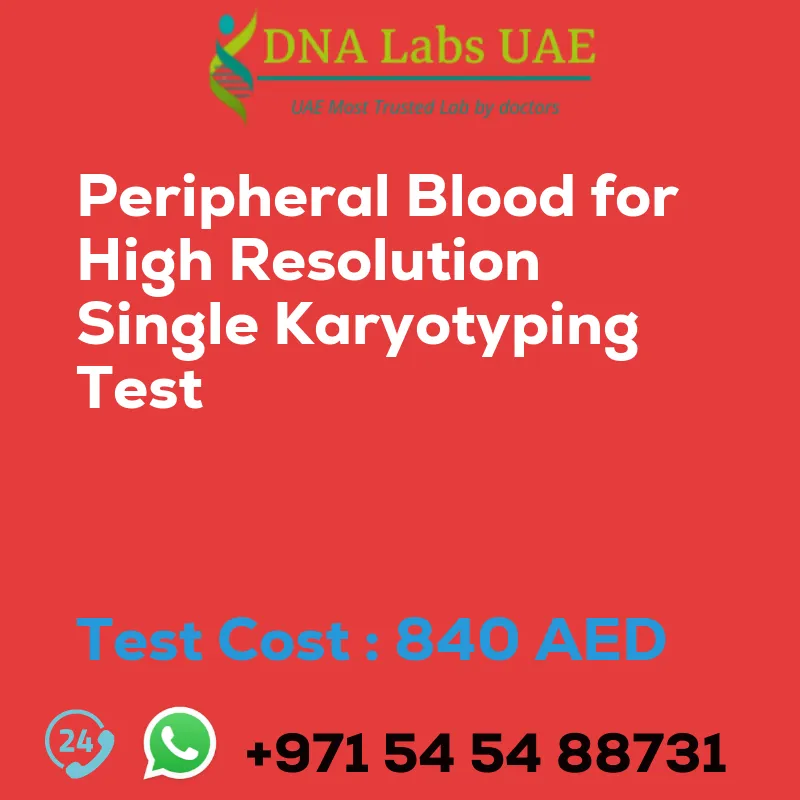Peripheral blood for High resolution Single Karyotyping Test
Test Name: Peripheral blood for High resolution Single Karyotyping Test
Components: Sodium Heparin Vacutainer (2ml)
Price: 840.0 AED
Sample Condition: Blood Sodium Heparin
Report Delivery: 7-9 days
Method: Cell culture
Test type: Genetics
Doctor: Gynecologist
Test Department:
Pre Test Information
Peripheral blood for High resolution karyotyping (SINGLE) can be done with a Doctors prescription. Prescription is not applicable for surgery and pregnancy cases or people planning to travel abroad.
Test Details
High resolution single karyotyping is a technique used to analyze the chromosomes in an individual’s cells. This technique can be performed on peripheral blood samples, which are obtained through a simple blood draw. To perform high resolution single karyotyping, the peripheral blood sample is first processed to isolate the white blood cells, which contain the genetic material (DNA) needed for analysis. The isolated white blood cells are then stimulated to divide and replicate their DNA. Once the cells have divided, they are treated with a chemical that stops cell division at a specific stage, usually metaphase. This ensures that the chromosomes are condensed and visible for analysis. Next, the cells are fixed onto a glass slide and stained with a dye that binds to the DNA, allowing the chromosomes to be visualized under a microscope. The stained chromosomes are then analyzed using high-resolution microscopy and imaging techniques. The chromosomes are examined for any structural abnormalities, such as translocations, deletions, or duplications. The number of chromosomes is also counted to check for aneuploidy, which is an abnormal number of chromosomes. The results of the high resolution single karyotyping can provide valuable information about an individual’s genetic makeup and help diagnose genetic disorders or identify chromosomal abnormalities that may be causing health problems. Overall, peripheral blood samples are commonly used for high resolution single karyotyping as they provide a relatively easy and non-invasive way to obtain cells for analysis.
| Test Name | Peripheral blood for High resolution Single Karyotyping Test |
|---|---|
| Components | Sodium Heparin Vacutainer (2ml) |
| Price | 840.0 AED |
| Sample Condition | Blood Sodium Heparin |
| Report Delivery | 7-9 days |
| Method | Cell culture |
| Test type | Genetics |
| Doctor | Gynecologist |
| Test Department: | |
| Pre Test Information | Peripheral blood for High resolution karyotyping (SINGLE) can be done with a Doctors prescription. Prescription is not applicable for surgery and pregnancy cases or people planing to travel abroad. |
| Test Details |
High resolution single karyotyping is a technique used to analyze the chromosomes in an individual’s cells. This technique can be performed on peripheral blood samples, which are obtained through a simple blood draw. To perform high resolution single karyotyping, the peripheral blood sample is first processed to isolate the white blood cells, which contain the genetic material (DNA) needed for analysis. The isolated white blood cells are then stimulated to divide and replicate their DNA. Once the cells have divided, they are treated with a chemical that stops cell division at a specific stage, usually metaphase. This ensures that the chromosomes are condensed and visible for analysis. Next, the cells are fixed onto a glass slide and stained with a dye that binds to the DNA, allowing the chromosomes to be visualized under a microscope. The stained chromosomes are then analyzed using high-resolution microscopy and imaging techniques. The chromosomes are examined for any structural abnormalities, such as translocations, deletions, or duplications. The number of chromosomes is also counted to check for aneuploidy, which is an abnormal number of chromosomes. The results of the high resolution single karyotyping can provide valuable information about an individual’s genetic makeup and help diagnose genetic disorders or identify chromosomal abnormalities that may be causing health problems. Overall, peripheral blood samples are commonly used for high resolution single karyotyping as they provide a relatively easy and non-invasive way to obtain cells for analysis. |








